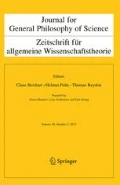Summary
Is there any argument for scepticism? The epistemic problem of the possibility of error. Arguments for scepticism rest on the assumption that knowledge claims are fallible. For this reason the concept of knowledge appears to be questionable. Since it is necessary to distinguish doubts from possible doubts, the arguments for scepticism appear to be unconvincing. If we take it into account that we know something that is immune to doubt, we should draw the conclusion that, contrary to scepticism, knowledge claims have to be compatible with being fallible. Thus any knowledge claim is capable of being doubted.
Similar content being viewed by others
References
Ayer, A.J.: 1956, The Problem of Knowledge, Penguin, Hammondsworth.
Baumann, P.: 2002, Erkenntnistheorie, Metzler, Stuttgart u.a.
Descartes, R.: 1959, Meditationes de prima philosophia, Hg. lat. u. dt. v. L. Gäbe, Meiner, Hamburg.
Haller, R.: 1964, “Das cartesische Dilemma”, in Zeitschrift für philosophische Forschung 18, 369–385.
Hossenfelder, M.: 1995, Die Philosophie der Antike: Stoa, Epikureismus und Skepsis, in: Röod, W. (Hg.), Geschichte der Philosophie Bd. 3, 2 Aufl., Beck, München.
Landesman, Ch.: 2002, Skepticism. The Central Issue, Blackwell, Oxford.
Lehrer, K.: 1971, “Why not Scepticism?”, in Philosophical Forum 2, 289–298.
Lehrer, K.: 1990, Theory of Knowledge, Routledge, London.
Putnam, H.: 1981, Reason, Truth and History, Cambridge University Press, Cambridge.
Rescher, N.: 1980, Scepticism: A Critical Reappraisal, Blackwell, Oxford.
Russell, B.: 1912, The Problems of Philosophy, Oxford University Press, Oxford.
Sextus Empiricus: 1999, Grundriβ, der pyrrhonischen Skepsis (Einl. u. Übers.v. M. Hossenfelder), 3. Aufl., Suhrkamp, Frankfurt/M.
Stroud, B.: 1984, The Significance of Philosophical Scepticism, Clarendon Press, Oxford.
Unger, P.: 1975, Ignorance. A Case for Scepticism, Clarendon Press, Oxford.
Welding, S. O.: 2002, Die Unerkennbarkeit des Geistes.Mentale Phänomene und menschliche Erkenntnis, Klett Cotta, Stuttgart.
Welding, S. O.: 2003, “Gibt es ein Erkenntnisproblem durch einen unendlichen Regress der Begründung?”, Prima Philosophia 16, 225–232.
Welding, S. O.: 2004, “Inwiefern sind mentale Phänomene eigentlich subjektiv?”, Aufklärung und Kritik 11(1), 94–101.
Welding, S. O.: 2005, “Descartes radikaler Zweifel und die unerschütterliche Gewissheit der eigenen Existenz”, Aufklarung und Kritik 12(1), 95–102.
Willaschek, M.: 2000, “Wissen, Zweifel, Kontext. Eine kontextualistische Zurückweisung des Skeptizismus”, Zeitschrift für philosophische Forschung 54(2), 151–172.
Author information
Authors and Affiliations
Rights and permissions
About this article
Cite this article
Welding, S.O. Kann Es Ein Argument Für Den Skeptizismus Geben? Das Epistemische Problem Der Irrtumsmöglichkeit. J Gen Philos Sci 36, 107–118 (2005). https://doi.org/10.1007/s10838-005-6038-1
Issue Date:
DOI: https://doi.org/10.1007/s10838-005-6038-1


